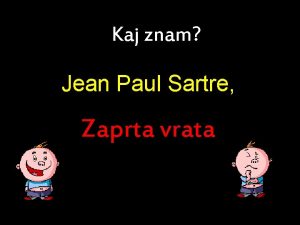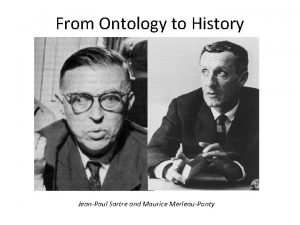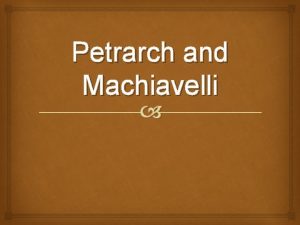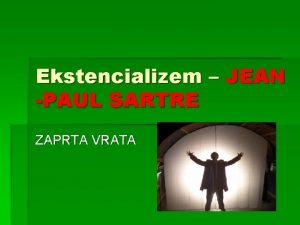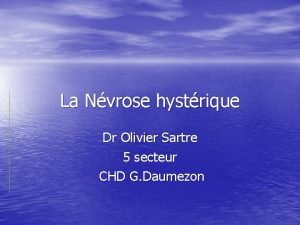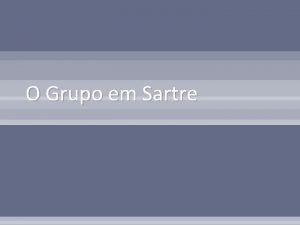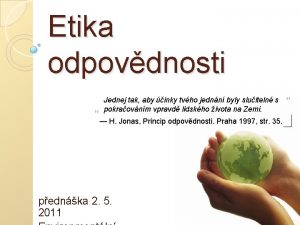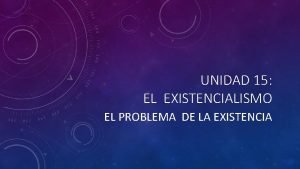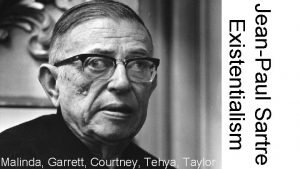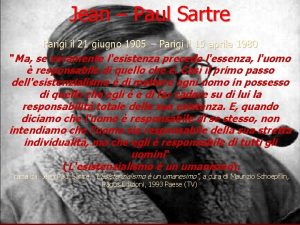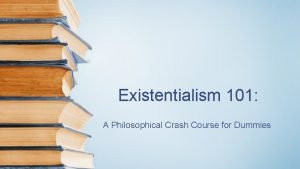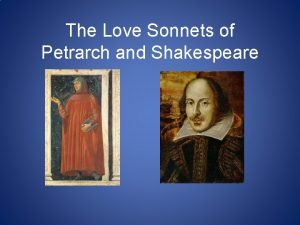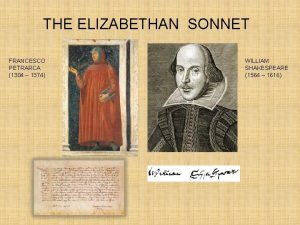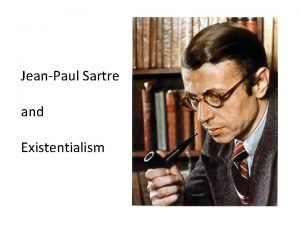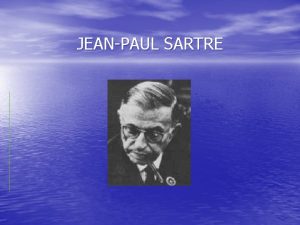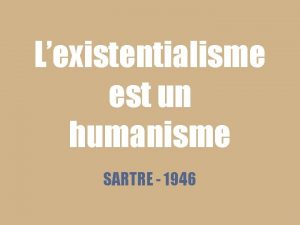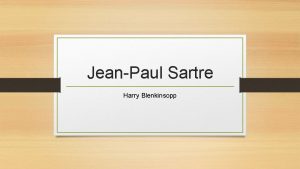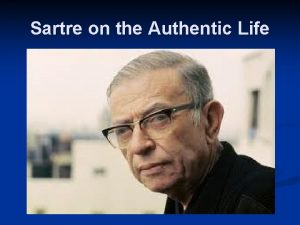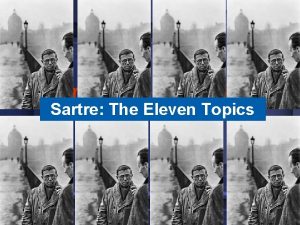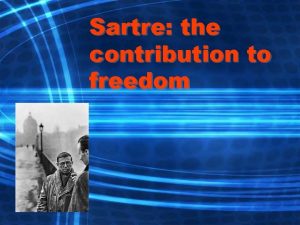FRANCESCO PETRARCH and JEAN PAUL SARTRE Campos Vera
















- Slides: 16

FRANCESCO PETRARCH and JEAN – PAUL SARTRE Campos, Vera ABE 121 HEURLIT Prof. Debbie

FRANCESCO PETRARCH

q. Petrarch was born Francesco Petrarca on July 20, 1304, in Arezzo, Tuscany. q. In France, Petrarch studied law, as his father had wished. However, his passion was for literature, particularly that of ancient Greece and Rome. After his father's death in 1326, Petrarch left law to focus on the classics.

q. Petrarch became a cleric, making him eligible for ecclesiastical postings, which supported him as he pursued his interest in ancient literature. q. Throughout his lifetime, Petrarch amassed an impressive collection of such texts, which he later bequeathed to Venice in exchange for a house, refuge from the plague.

q. As Petrarch learned more about the classical period, he began to venerate that era and rail against the limitations of his own time. Though he felt that he lived "amid varied and confusing storms, " Petrarch believed that humanity could once more reach the heights of past accomplishments. The doctrine he espoused became known as humanism, and formed a bridge from the Middle Ages to the Renaissance.

q. Petrarch's other passion was writing. His first pieces were poems that he composed after the death of his mother. q. Petrarch's writing was greatly admired during his lifetime, and he was crowned Rome's poet laureate in 1341. q. The work Petrarch held in highest regard was his Latin composition Africa, an epic poem about the Second Punic War.

q. Petrarch's most well-known vernacular compositions were lyrical poems about Laura, a woman he had fallen in unrequited love with after seeing her in an Avignon church on April 6, 1327. q. Petrarch wrote about Laura—whose true identity has never been verified—for most of his life, even after she died during the Black Death of 1348.

• Petrarch passed away just before his 70 th birthday, in Arquà (near Padua), Carrara, which is now part of Italy. After retiring to work in his study on July 18, 1374, Petrarch died during the night. • As one of the world's first classical scholars, Petrarch unearthed vast stores of knowledge in the lost texts he discovered, while his philosophy of humanism helped foment the intellectual growth and accomplishments of the Renaissance. Petrarch's legacy also includes his poems, sonnets and other writing.

SONNET 227 Breeze, blowing that blonde curling hair, stirring it, and being softly stirred in turn, scattering that sweet gold about, then gathering it, in a lovely knot of curls again, you linger around bright eyes whose loving sting pierces me so, till I feel it and weep, and I wander searching for my treasure, like a creature that often shies and kicks:

now I seem to find her, now I realise she’s far away, now I’m comforted, now despair, now longing for her, now truly seeing her. Happy air, remain here with your living rays: and you, clear running stream, why can’t I exchange my path for yours?

q. Petrarch is also known to be the “Father of Humanism”. q. He believed in the immense moral and practical value of the study of ancient history and literature – that is, the study of human thought and action. Petrarch was a devout Catholic and did not see a conflict between realizing humanity's potential and having religious faith.

JEAN – PAUL SARTRE

q. Jean-Paul Sartre, (1905 -1980) born in Paris in 1905, studied at the École Normale Supérieure from 1924 to 1929 and became Professor of Philosophy at Le Havre in 1931. q. He was a French philosopher, playwright, novelist, political activist, biographer, and literary critic. He was one of the key figures in the philosophy of existentialism and phenomenology, and one of the leading figures in 20 th-century French philosophy and Marxism.

q. Sartre is one of those writers for whom a determined philosophical position is the centre of their artistic being. q“Man is condemned to freedom, a freedom from all authority, which he may seek to evade, distort, and deny but which he will have to face if he is to become a moral being. The meaning of man's life is not established before his existence. ”

q. His central philosophical work, L'Etre et le néant (Being and Nothingness), 1943, is a massive structuralization of his concept of being, from which much of modern existentialism derives. The existentialist humanism which Sartre propagates in his popular essay L'Existentialisme est un humanisme(Existentialism is a Humanism), 1946, can be glimpsed in the series of novels, Les Chemins de la Liberté (The Roads to Freedom), 1945 -49.

q. One of the main features of this system, which Sartre presents in the introduction and the first chapter of Part One, is a distinction between two kinds of transcendence of the phenomenon of being. The first is the transcendence of being and the second that of consciousness. q. On the one hand, there is the being of the object of consciousness, and on the other, that of consciousness itself. These define two types of being, the in-itself and the for-itself. To bring out that which keeps them apart, involves understanding the phenomenology of nothingness.
 Lycee jps
Lycee jps Sartre zaprta vrata
Sartre zaprta vrata Jean paul sartre
Jean paul sartre Petrarch
Petrarch Akda ni francesco petrarch
Akda ni francesco petrarch Sartre zaprta vrata
Sartre zaprta vrata Olivier sartre
Olivier sartre Serialidade sartre
Serialidade sartre Sartre adalah
Sartre adalah Sartre fan dufflecoat ente gauloises
Sartre fan dufflecoat ente gauloises Essencia sartre
Essencia sartre Existencialismo sartre
Existencialismo sartre Tehya taylor
Tehya taylor Sartre pensiero
Sartre pensiero Existentialism for dummies
Existentialism for dummies Petrarch and shakespeare
Petrarch and shakespeare Turning point sonnet
Turning point sonnet

